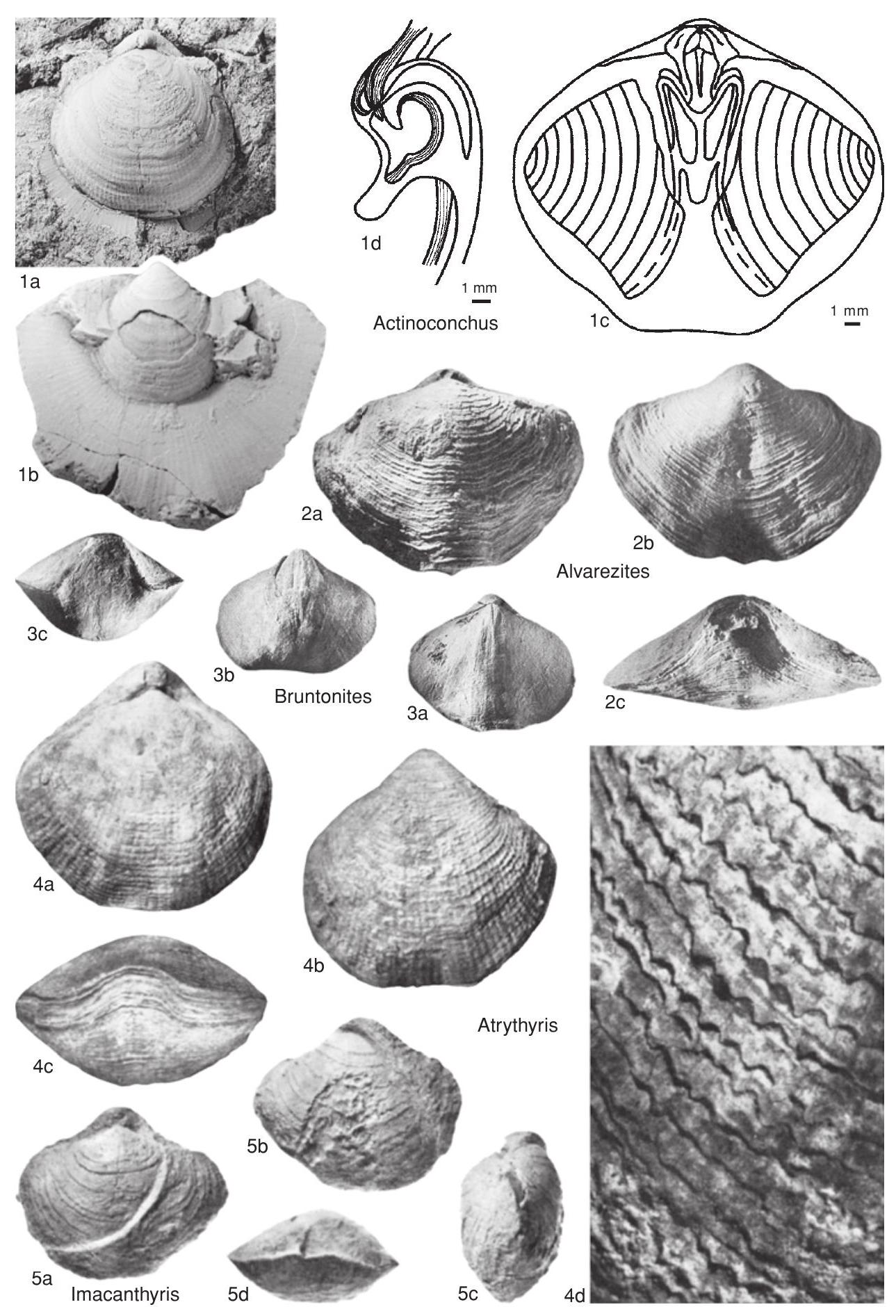Welcome to the Treatise on Invertebrate Paleontology!
Please enter a genera name to retrieve more information.

Actinoconchus
Classification
Phylum:
Brachiopoda
Subphylum:
Rhynchonelliformea
Class:
Rhynchonellata
Order:
Athyridida
Suborder:
Athyrididina
Superfamily:
Athyridoidea
Family:
Athyrididae
Subfamily:
Athyridinae
Formal Genus Name and Reference:
Actinoconchus M'Coy, 1844, p. 149, Actinoconchus M'Coy in GRIFFITH, 1842, p. 18, nom. nud.
Type Species:
A. paradoxus, M
Images
(Click to enlarge in a new window)
Fig. 1015,1a–b. *A. paradoxus, Viséan, Kildare, Ireland; a, lectotype viewed dorsally, NMING: F6660, Griffith Collection; b, ventral view showing flanges, BMNH B5392, Davidson Collection, ×1.5 (Brunton, 1980; photographs courtesy of C. H. C. Brunton).——Fig . 1015,1c–d. A. planosulcata (PHILLIPS), Lower Carboniferous, Yorkshire, England; ventral and lateral views showing jugum (Glass in Davidson, 1882). [See also Fig. 1002.5, p. 1477, in introduction.
Synonyms
Actinoconchus
Geographic Distribution
southern China, upper Famennian, Europe, North America, Middle East, China, Australia, Viséan-Bashkirian, northeastern China, ?India, ?Lower Permian
Age Range
Beginning Stage in Treatise Usage:
Upper Devonian (upper Famennian)
Beginning International Stage:
Famennian
Fraction Up In Beginning Stage:
50
Beginning Date:
365.2
Ending Stage in Treatise Usage:
Upper Carboniferous, ?Lower Permian (Bashkirian)
Ending International Stage:
Bashkirian
Fraction Up In Ending Stage:
100
Ending Date:
315.15
Description
"Medium to large, biconvex, elongate oval, subcircular to transversely oval shells, very long, flat, delicate, radially striated, nonspinose flanges of shell from rugae or strong growth lines on both valves, dorsal fold and ventral sulcus absent or with shallow sulci on both valves forming ligate anterior, internal characters imperfectly known, jugum essentially as in Athyris. [A. paradoxus was the only species described under Actinoconchus so it must be considered the type by monotypy. DAVIDSON (1859) placed A. paradoxus into subjective synonymy with Athyris planosulcata (PHILLIPS, 1836) and many authors have accepted this. We agree with CARTER (1967) and BRUNTON (1980) in believing the two species to be distinct and so retain the name A. paradoxus for the type species of Actinoconchus.]"
References
Museum or Author Information
Classification
Phylum:
Brachiopoda
Subphylum:
Rhynchonelliformea
Class:
Rhynchonellata
Order:
Athyridida
Suborder:
Athyrididina
Superfamily:
Athyridoidea
Family:
Athyrididae
Subfamily:
Athyridinae
Formal Genus Name and Reference:
Actinoconchus M'Coy, 1844, p. 149, Actinoconchus M'Coy in GRIFFITH, 1842, p. 18, nom. nud.
Type Species:
A. paradoxus, M
Images
(Click to enlarge in a new window)
Fig. 1015,1a–b. *A. paradoxus, Viséan, Kildare, Ireland; a, lectotype viewed dorsally, NMING: F6660, Griffith Collection; b, ventral view showing flanges, BMNH B5392, Davidson Collection, ×1.5 (Brunton, 1980; photographs courtesy of C. H. C. Brunton).——Fig . 1015,1c–d. A. planosulcata (PHILLIPS), Lower Carboniferous, Yorkshire, England; ventral and lateral views showing jugum (Glass in Davidson, 1882). [See also Fig. 1002.5, p. 1477, in introduction.
Synonyms
Actinoconchus
Geographic Distribution
southern China, upper Famennian, Europe, North America, Middle East, China, Australia, Viséan-Bashkirian, northeastern China, ?India, ?Lower Permian
Age Range
Beginning Stage in Treatise Usage:
Upper Devonian (upper Famennian)
Beginning International Stage:
Famennian
Fraction Up In Beginning Stage:
50
Beginning Date:
365.2
Ending Stage in Treatise Usage:
Upper Carboniferous, ?Lower Permian (Bashkirian)
Ending International Stage:
Bashkirian
Fraction Up In Ending Stage:
100
Ending Date:
315.15
Description
"Medium to large, biconvex, elongate oval, subcircular to transversely oval shells, very long, flat, delicate, radially striated, nonspinose flanges of shell from rugae or strong growth lines on both valves, dorsal fold and ventral sulcus absent or with shallow sulci on both valves forming ligate anterior, internal characters imperfectly known, jugum essentially as in Athyris. [A. paradoxus was the only species described under Actinoconchus so it must be considered the type by monotypy. DAVIDSON (1859) placed A. paradoxus into subjective synonymy with Athyris planosulcata (PHILLIPS, 1836) and many authors have accepted this. We agree with CARTER (1967) and BRUNTON (1980) in believing the two species to be distinct and so retain the name A. paradoxus for the type species of Actinoconchus.]"
